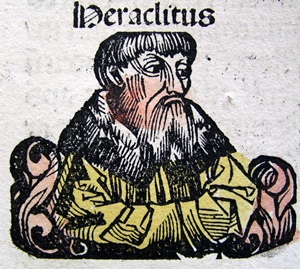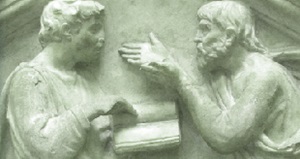Heraclitus Quotes
Quotes by and about Heraclitus
(Continued from his main entry on the site.)
[When asked why he preferred silence:]
Heraclitus: "So you can do the blabbing."
Heraclitus: "Eyesight is a lying sense."
Heraclitus: "Fools get excited no matter what you tell them."
Constantine J. Vamvacas: "[Heraclitus'] thought is at once both highly abstract ... and extremely concrete."
Karl Popper: "He had a masterly sneer."
Daniel W. Graham: "Heraclitus liked to abuse his predecessors, and he tends to radically rework the material he inherits."
Heraclitus and Ni
C.G. Jung: "[The Ni type's] argument lacks convincing reason. He can only confess or pronounce."
Constantine J. Vamvacas: "Heraclitus does not demonstrate but manifest; he does not discuss ... but weaves an image."
Diogenes Laertius: "[Heraclitus] hated humans so much that he wandered into the mountains and lived off grass and herbs. However, when this gave him [a bad stomach], he made his way back to the city and put the riddle to the physicians if they were competent to create a drought after a heavy rain. They could make nothing of this."
Diogenes Laertius: "[Heraclitus] was exceptional already from early boyhood."

Diogenes Laertius: "[Heraclitus] claimed to know everything."
Diogenes Laertius: "[Heraclitus] was nobody's pupil. He claimed he was taught by 'inquiring of himself.'"
Diogenes Laertius: "[Heraclitus] wished that none but the most competent should read his work.'"
Diogenes Laertius: "[Heraclitus] was shrill [and] a mob-reviler."
Diogenes Laertius: "Though prone to depression [and misanthropy, Heraclitus] was also magnanimous.'"
Diogenes Laertius: "For brevity and weightiness his writing style is incomparable."
Diodorus: "While some call [Heraclitus'] book 'On Nature' its [true] title was: 'A Helm Unerring For The Rule Of Life.'"

Diogenes Laertius: "[Heraclitus] was above all men of a lofty and arrogant spirit, as is plain from his writings."
Rayan A. Jones: "Jung attributed to Heraclitus the discovery of the regulative function of opposites or enantiodromia."
C.G. Jung: "I use [Heraclitus' discovery of] enantiodromia for the emergence of the unconscious opposite in the course of time. This characteristic phenomenon practically always occurs when an extreme, onesided tendency dominates conscious life; in time an equally powerful counterposition is built up, which first inhibits the conscious performance and subsequently breaks through the conscious control."
Robert R. Holt: "Plato was enough influenced by Heraclitus to believe that the direct objects of observation were but transitory."
David Brett-Evans: "Nietzsche was greatly attracted to [Heraclitus] - this somewhat mystical and decidedly pessimistic writer."
Friedrich Nietzsche: "No man ever wrote more eloquently and luminously [than Heraclitus]."
Friedrich Nietzsche: "The world NEEDS Heraclitus."
Friedrich Nietzsche: "Heraclitus was an opponent of all democratic parties."
Friedrich Nietzsche: "[Heraclitus had] the highest form of pride [stemming] from a certainty of belief in the truth as grasped by himself alone. He brings this form, by its excessive development, into a sublime pathos by involuntary identification of himself with his truth."
Friedrich Nietzsche: "[Heraclitus had] a regal air of certainty."
Friedrich Nietzsche: "The self-glorification of Heraclitus contains nothing religious; he sees outside himself only error, illusion, an absence of knowledge - but no bridge leads him to his fellow man, no overpowering feeling of sympathetic stirring binds them to him."
Osho: "I have been in love with the thought of Heraclitus."
Osho: "It was Heraclitus' ideas that seized Nietzsche so totally that he became completely mad."
Friedrich Nietzsche: "[Heraclitus' language] dispenses with lightness and artificial decoration, foremost out of disgust for humanity and out of [his own] defiant feeling."
Friedrich Nietzsche: "[Heraclitus speaks as if] in entrancement ... but [also] truthfully."
Friedrich Nietzsche: "[Heraclitus had] pride not in logical knowledge but rather in intuitive grasping of the truth."
Friedrich Nietzsche: "[Heraclitus] did not require humans or their sort of knowledge, since everything into which one may inquire he despises [as being] in contrast [to his own] inward-turning wisdom. [To him] all learning from others is a sign of nonwisdom, because the wise man focuses his vision on his own intelligence."
Friedrich Nietzsche: "[Heraclitus] concluded that coming-to-be itself could not be anything evil or unjust."
Friedrich Nietzsche: "Each word of Heraclitus expresses the pride and the majesty of truth, but of truth grasped in intuitions rather than attained by the rope ladder of logic."
Antoine Panaioti: "[To] Nietzsche, Parmenides ... was wrong and Heraclitus was right."